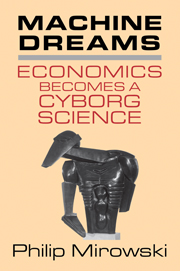Book contents
- Frontmatter
- Contents
- List of Figures and Tables
- Acknowledgments
- List of Abbreviations
- 1 Cyborg Agonistes
- 2 Some Cyborg Genealogies; or, How the Demon Got Its Bots
- 3 John von Neumann and the Cyborg Incursion into Economics
- 4 The Military, the Scientists, and the Revised Rules of the Game
- 5 Do Cyborgs Dream of Efficient Markets?
- 6 The Empire Strikes Back
- 7 Core Wars
- 8 Machines Who Think versus Machines That Sell
- Envoi
- References
- Index
5 - Do Cyborgs Dream of Efficient Markets?
Published online by Cambridge University Press: 05 June 2012
- Frontmatter
- Contents
- List of Figures and Tables
- Acknowledgments
- List of Abbreviations
- 1 Cyborg Agonistes
- 2 Some Cyborg Genealogies; or, How the Demon Got Its Bots
- 3 John von Neumann and the Cyborg Incursion into Economics
- 4 The Military, the Scientists, and the Revised Rules of the Game
- 5 Do Cyborgs Dream of Efficient Markets?
- 6 The Empire Strikes Back
- 7 Core Wars
- 8 Machines Who Think versus Machines That Sell
- Envoi
- References
- Index
Summary
When I think of it, it's not such a great distance from communist cadre to software engineer. I may have joined the party to further social justice, but a deeper attraction could have been to a process, a system, a program. I'm inclined to think I've always believed in the machine.
Ellen Ullman, Close to the MachineFROM RED VIENNA TO COMPUTOPIA
As I sit here staring at a laptop, it seems one of the most histronic statements in the world to insist that computers have a politics. It would appear that I could effortlessly bend this machine – small, portable, and eminently personal (though perhaps a little too warm and nowhere near cuddly) – to whatever idiosyncratic purposes I might harbor. However much it may now sport a tabula rasa on its user-friendly face, that was definitely not the way it was viewed in the first half of the century. An economist in the runup to the 1950s would have almost inevitably associated a fascination with the existence of something called a computer with a leftish inclination to believe that market economies could be controlled through some form of scientific planning. Although this political connotation was left out of the account of the rise of the three postwar schools of neclassical economics in the previous chapter, its continued omission would be unpardonable. Because the confluence of computation, mathematical economics, and state planning is a key theme in the histories of the Cowles Commission and RAND, a basic prerequisite for understanding the cyborg incursion into economics is a passing acquaintance with the perfervid question of “market socialism” in the 1930s and 1940s.
- Type
- Chapter
- Information
- Machine DreamsEconomics Becomes a Cyborg Science, pp. 232 - 308Publisher: Cambridge University PressPrint publication year: 2001



